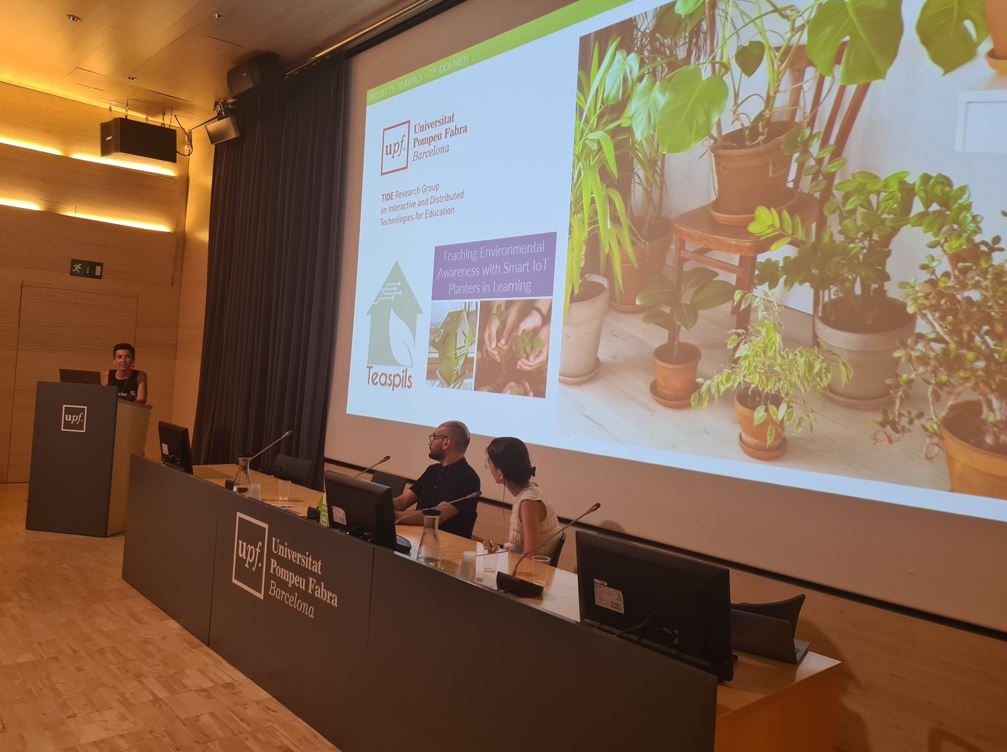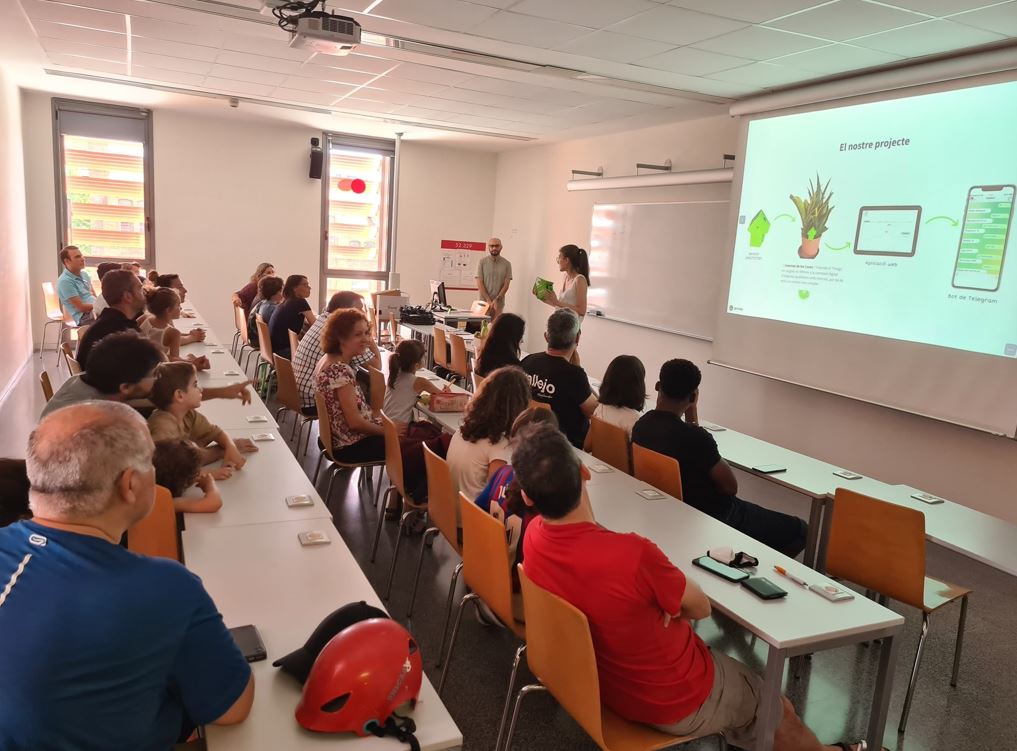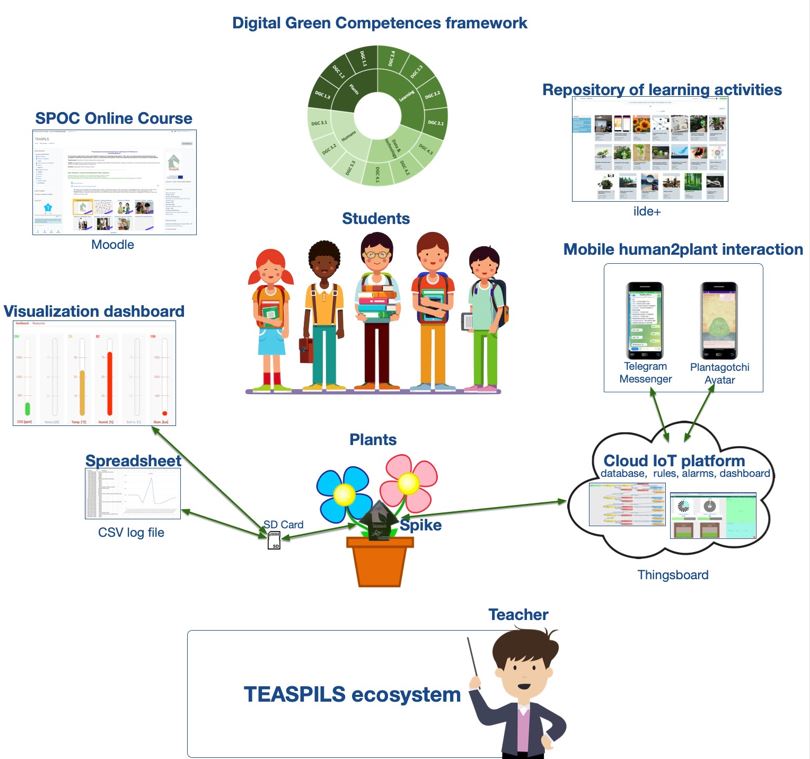Smart technologies to show the benefits of plants in educational environments, created by a European project involving UPF
Smart technologies to show the benefits of plants in educational environments, created by a European project involving UPF
The European research project TEASPILS, which involves UPF’s TIDE research group, has investigated over the last three years how to take advantage of so-called Internet of Things to exchange real-time data on the impact of plants in learning environments and thus raise awareness among the educational community of their benefits. The project has been driven by a consortium of six European centres, coordinated by the UPM.

Plants have many positive effects on mental health, well-being and the air quality of indoor spaces, but these benefits are not sufficiently taken into account in educational settings. In this context, the European research project TEASPILS has investigated how to take advantage of technologies, and specifically so-called Internet of Things, to raise awareness among the educational community of the benefits that installing plants in learning environments such as classrooms, study rooms, offices or libraries can have. UPF is participating in the European consortium that is driving the project, coordinated by the Polytechnic University of Madrid.
The concept of Internet of Things refers to a network of physical objects that incorporate sensors, software and other technologies, which allow them to connect to each other to exchange data over the Internet, without the need for human intervention. In this project, IoT has been used to exchange data on the environmental benefits of plants in education centres, between different technological devices, for example between a smart planter and a mobile.
The ability to visualize in real time data on the impact of plants in schools contributes to raising the awareness of students and teachers
The increasing availability of sensors, networks and cloud services on the Internet facilitates means to analyse plant data in real time and the impact they have on the environment where they are located. Being able to visualize these data from the technological devices of the education centres contributes to raising the environmental awareness of students and teachers.
After three years of research with these goals, the TEASPILS project is coming to an end. To take stock of its results, on 19 and 20 June the UPF Poblenou campus hosted the final meeting of the project, funded by the EU’s Erasmus+ programme and developed by a consortium of six European universities, coordinated by the Polytechnic University of Madrid (UPM). UPF is represented by the TIDE (Interactive & Distributed Technologies for Education) research group of the Department of Information and Communication Technologies.

The following centres also belong to the TEASPILS consortium: University College of Teacher Education Vienna (Austria), University College for Agricultural and Environmental Education (Austria), Doukas School (Greece), and Open University of Cyprus (Cyprus).
Davinia Hernández-Leo, head of the UPF TIDE research: “The project has advanced knowledge and technology to facilitate environmental awareness towards plants and greenery and has educated young people and their teachers towards ecological learning spaces”
Davinia Hernández-Leo, head of TIDE at UPF, explains, “The project has advanced knowledge and technology to facilitate environmental awareness regarding plants and greenery and has educated young people and their teachers towards ecological learning spaces, in relation to the sustainable development goals (SDG) of the United Nations Agenda 2030”.
To progress in this direction, the TEASPILS project has developed an open online course for educators and policy makers on how to foster environmental awareness in schools and on how to promote the use of intelligent planters (IoT) to collect environmental data in learning spaces, dashboards to visualize sensory data in mobile and web applications, and a gamification framework, which promotes environmental awareness in a pedagogical way from data provided by the digital sensors.

Bernardo Tabuenca (UFM), project coordinator: “TEASPILS has provided (...) an IoT system, which we call Spike, specifically designed to monitor plants in learning spaces”
In this sense, Bernardo Tabuenca (UPM), coordinator of the project, adds: “TEASPILS has provided a theoretical framework for the design of learning activities to promote environmental awareness, a framework of ‘green’ digital competences, an IoT system, which we call Spike, specifically designed to monitor plants in learning spaces, accompanied by a dashboard and a set of examples for training related to learning activities. Our pilot tests show the potential of IoT technology to teach and promote environmental awareness”.
Pilot tests of the TEASPILS project in schools in Spain, Greece and Austria
The activities of the pilot test have been carried out in real classrooms in Spain, Greece and Austria, corresponding to education centres of different levels, from primary to higher education.
Further information:
Innovative learning activities with the project technology developed (open repository and platform of the teaching community): https://ildeplus.upf.edu/teaspils/
Overview of the project:
Reference article:
Tabuenca, B., Moreno-Sancho, J. L., Arquero-Gallego, J., Greller, W., & Hernández-Leo, D. (2023). Generating an environmental awareness system for learning using IoT technology. Internet of Things, 22, 100756. https://doi.org/10.1016/j.iot.2023.100756
